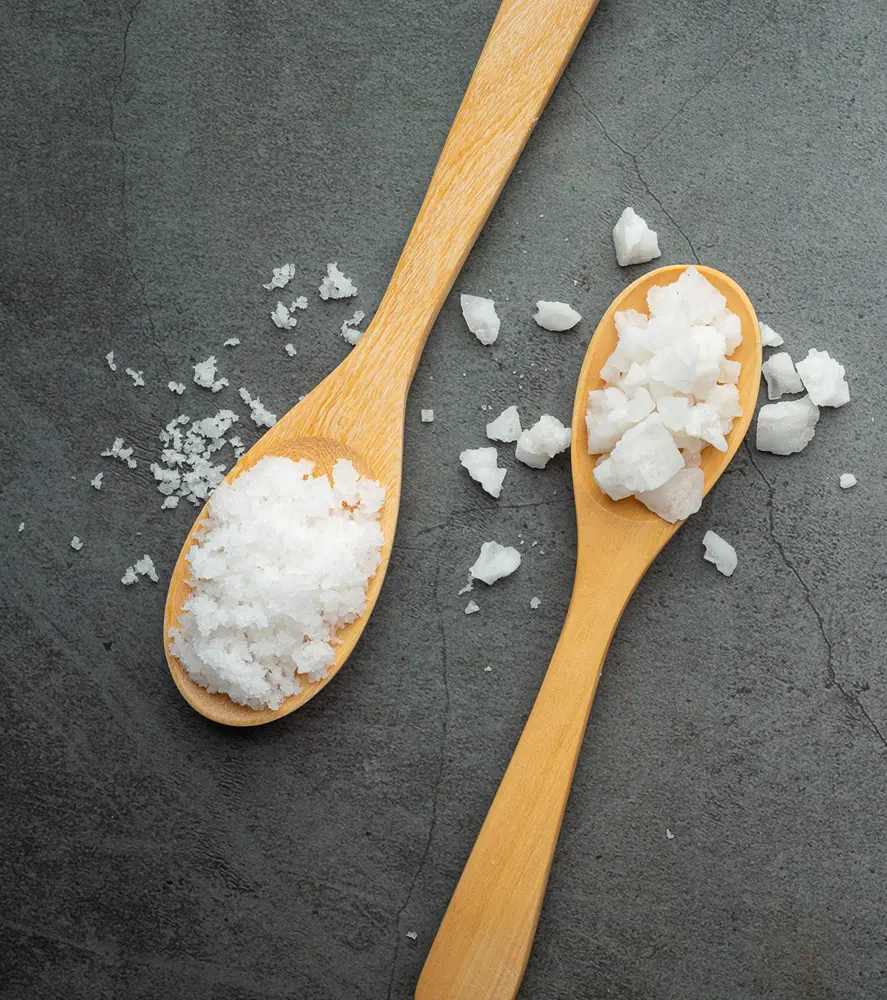16 Health Benefits Of Sea Salt

Sea salt, derived from the evaporation of seawater, is celebrated not only for its culinary uses but also for its health benefits. Rich in essential minerals and devoid of the chemical processing that table salt undergoes, sea salt has a plethora of advantages that contribute to overall well-being.
Here, we explore 16 health benefits of sea salt and delve deeper into its various uses and advantages.
1. Rich Source of Minerals
Sea salt contains a variety of essential minerals, including magnesium, calcium, potassium, and iron. These minerals play crucial roles in maintaining healthy bodily functions.
Magnesium is vital for muscle and nerve function, calcium supports bone health, potassium regulates fluid balance, and iron is necessary for oxygen transport in the blood.
2. Aids in Hydration
Unlike regular table salt, sea salt helps maintain the body's electrolyte balance. The minerals in sea salt, particularly potassium, assist in maintaining the proper fluid balance within cells and tissues, promoting optimal hydration.
This makes sea salt a valuable addition to the diet, especially for athletes and individuals engaging in strenuous physical activities.
3. Supports Thyroid Function
Sea salt is a natural source of iodine, a mineral essential for thyroid health. The thyroid gland relies on iodine to produce hormones that regulate metabolism, energy production, and growth.
Incorporating sea salt into the diet can help ensure adequate iodine intake, supporting thyroid function and preventing conditions such as hypothyroidism and goiter.
4. Enhances Digestion
The chloride in sea salt is a component of hydrochloric acid, which is necessary for proper digestion. Adequate production of stomach acid is crucial for breaking down food, absorbing nutrients, and preventing gastrointestinal infections.
Sea salt can stimulate the production of digestive enzymes, promoting better digestion and nutrient absorption.
5. Balances Blood Sugar Levels

Research suggests that sea salt may help in regulating blood sugar levels. The minerals in sea salt improve insulin sensitivity and reduce inflammation, both of which are critical for maintaining stable blood sugar levels.
This can be particularly beneficial for individuals with diabetes or those at risk of developing the condition.
6. Improves Skin Health
Sea salt is renowned for its skin benefits. When used in baths or scrubs, it can exfoliate dead skin cells, promote circulation, and provide a soothing effect.
The minerals in sea salt can also aid in the healing of skin conditions such as eczema, psoriasis, and acne. Sea salt baths can detoxify the skin, reduce inflammation, and enhance its natural glow.
7. Alleviates Muscle Cramps
Magnesium and potassium, found in sea salt, are essential for muscle function. These minerals help relax muscles, reduce spasms, and prevent cramps.
Athletes and individuals who experience frequent muscle cramps may find relief by incorporating sea salt into their diet or using sea salt baths for muscle relaxation.
8. Reduces Inflammation
The anti-inflammatory properties of sea salt are beneficial for reducing inflammation in the body. Chronic inflammation is linked to numerous health issues, including arthritis, cardiovascular disease, and autoimmune disorders.
The minerals in sea salt can help reduce inflammation markers and support overall health.
9. Promotes Respiratory Health
Inhaling sea salt-infused air, also known as halotherapy or salt therapy, can improve respiratory health. This practice can help clear mucus, reduce congestion, and alleviate symptoms of conditions such as asthma, bronchitis, and sinusitis.
Salt therapy sessions in salt caves or using salt inhalers can provide significant respiratory benefits.
10. Supports Heart Health

While excessive salt intake is often associated with high blood pressure, moderate consumption of natural sea salt can actually support heart health. The potassium in sea salt helps balance sodium levels, reducing the risk of hypertension.
Additionally, the trace minerals in sea salt can improve circulation and reduce the risk of cardiovascular disease.
11. Enhances Brain Function
The electrolytes in sea salt are vital for brain function. Sodium, in particular, is crucial for maintaining nerve impulses and proper communication between neurons.
Adequate sodium levels can enhance cognitive function, improve concentration, and prevent conditions such as brain fog and cognitive decline.
12. Boosts Immune System
Sea salt can support a healthy immune system. The minerals in sea salt, such as zinc and selenium, play critical roles in immune function.
These minerals help in the production of immune cells, enhance the body's ability to fight infections, and reduce inflammation, thereby strengthening the immune response.
13. Regulates Sleep Patterns
Minerals like magnesium in sea salt can have a calming effect on the nervous system, promoting better sleep.
Magnesium helps regulate neurotransmitters and hormones that are involved in sleep regulation. Consuming sea salt or taking a sea salt bath before bedtime can improve sleep quality and help manage sleep disorders.
14. Improves Oral Health
Sea salt is beneficial for oral health due to its antibacterial properties. Gargling with sea salt water can help reduce oral bacteria, prevent gum disease, and alleviate symptoms of sore throat.
Sea salt can also be used as a natural mouthwash to promote healthy gums and fresh breath.
15. Supports Bone Health

The minerals in sea salt, particularly calcium and magnesium, are essential for maintaining strong and healthy bones.
These minerals contribute to bone density and strength, reducing the risk of osteoporosis and fractures. Incorporating sea salt into the diet can help support overall bone health.
16. Provides Electrolyte Balance
Sea salt is an excellent source of electrolytes, which are crucial for maintaining the body’s fluid balance, muscle function, and nerve signaling. Electrolytes like sodium, potassium, and magnesium are lost through sweat, especially during intense physical activity.
Consuming sea salt can help replenish these electrolytes and prevent dehydration and related symptoms.
Additional Uses and Benefits of Sea Salt
Beyond its direct health benefits, sea salt has various uses that contribute to overall well-being. Here are some additional applications and advantages of sea salt:
Culinary Uses
Sea salt is a versatile ingredient in the kitchen. Its distinct flavor and texture enhance the taste of dishes, making it a preferred choice for chefs and home cooks alike. Sea salt can be used in cooking, baking, and seasoning, adding depth and complexity to a variety of recipes.
Bath Soaks and Spa Treatments
Sea salt baths are a popular spa treatment known for their relaxing and therapeutic effects. Soaking in a sea salt bath can detoxify the body, relieve stress, and soothe sore muscles. Adding essential oils to a sea salt bath can enhance the experience, providing additional benefits such as aromatherapy and skin nourishment.
Exfoliating Scrubs
Sea salt is a natural exfoliant that can be used to create homemade scrubs. Mixing sea salt with oils such as coconut or olive oil can create a scrub that removes dead skin cells, improves circulation, and leaves the skin feeling soft and rejuvenated. Sea salt scrubs can be used on the face and body for a refreshing and revitalizing treatment.
Nasal Irrigation
Sea salt solutions are commonly used for nasal irrigation, a practice that helps clear nasal passages and alleviate sinus congestion. A saline solution made with sea salt can be used with a neti pot or nasal spray to flush out mucus, reduce inflammation, and promote easier breathing.
Detoxification
Sea salt is often used in detoxification practices due to its ability to draw out toxins from the body. Detox baths, which involve soaking in a mixture of sea salt and other detoxifying agents like baking soda or clay, can help cleanse the skin, improve circulation, and support the body's natural detoxification processes.
Foot Soaks
Soaking feet in a sea salt bath can provide relief from tired, aching feet. The minerals in sea salt can soothe muscle cramps, reduce swelling, and soften calluses. Adding a few drops of essential oils to the foot soak can enhance relaxation and provide additional therapeutic benefits.
Preservation
Sea salt has been used for centuries as a natural preservative. Its antimicrobial properties make it effective in preserving food, preventing the growth of bacteria, and extending the shelf life of perishable items. Sea salt can be used in pickling, curing meats, and preserving vegetables.
Gardening
Sea salt can also benefit gardening. When used in appropriate amounts, it can enhance soil health and promote plant growth. Sea salt provides essential minerals that can improve soil structure, increase nutrient availability, and support the overall health of plants.
Cleaning
Sea salt's abrasive texture and natural cleaning properties make it an effective household cleaner. It can be used to scrub surfaces, remove stains, and clean kitchen utensils. Sea salt can also be combined with other natural cleaning agents, such as lemon juice or vinegar, for enhanced cleaning power.







